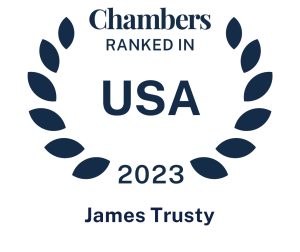James M. Trusty
MEMBER
"I think my clients appreciate my judgment, work ethic, and top-level advocacy in front of key executive and judicial decision makers."
Overview
After 27 years as a prosecutor, James (“Jim”) Trusty brings to Ifrah Law extensive experience in complex, multi-district white collar litigation, especially in matters involving RICO, The Computer Fraud and Abuse Act, and The Money Laundering Control Act of 1986.
As the federal government continues to apply increasingly broad interpretations of these statutes in its investigations and prosecutions of white collar defendants, corporations and individuals can face the threat of exponentially higher monetary penalties and added jail time. To clients defending against such allegations, Jim offers the insider’s view on how federal cases are built, investigations pursued, and settlements negotiated. Ranked by Chambers USA as one of America’s leading lawyers for litigation in White-Collar Crime and Government Investigations, the publication notes, “Former prosecutor James Trusty offers deep expertise in white-collar litigation….”; and clients told Chambers researchers, “James has a good personality and kept me at ease,” and that he “is a well-versed, high-stakes type individual white-collar lawyer.”
Joining Ifrah Law after a long career in public service, most recently as Chief of the Organized Crime Section at the United States Department of Justice, Jim now focuses his practice on the litigation and resolution of complex disputes for clients in a broad array of industries facing issues ranging from cybersecurity and computer fraud to civil RICO and asset forfeiture. He has extensive experience in the representation of high-profile individuals as both plaintiff and defendant in widely publicized cases involving state and federal government issues.
For seven years, Jim served in the DOJ’s Criminal Division, where he was ultimately responsible for investigating and prosecuting regional, national, and international cases, supervising significant pleadings and providing strategic and tactical guidance in complex investigations and multi-defendant trials. In addition to running the RICO review unit, he also was in charge of establishing and promoting policies focused on immigration reform, firearms trafficking, proposed Congressional testimony for DOJ officials, and internet gambling. Significant and sensitive matters on which he worked include the post-conviction review of Alaska corruption cases related to U.S. v. Theodore Stevens, the investigation into allegations of misconduct by a sitting U.S. Attorney and one of her Assistant U.S. Attorneys, and numerous death penalty cases.
Prior to his work at DOJ, Jim acted as Assistant U.S. Attorney in Greenbelt, Maryland, where he investigated and prosecuted a wide variety of white collar and other criminal cases, including the Washington, DC area Sniper investigation.
In 2018, Jim was appointed by the Governor of Maryland to serve on The Task Force to Study Maryland’s Criminal Gang Statutes. The Task Force will review and consider the efficacy of existing state laws as they apply to gang-related criminal activity in the state. After their review is complete, the Task Force will present their findings and recommendations to the Governor.
Jim regularly speaks at conferences, seminars, and training sessions on topics related to complex litigation and criminal law. In addition to his work on numerous pro bono projects, he has been an Adjunct Professor for the University of Maryland’s Criminal Justice Department for eight years, and coached Mock Trial teams at American University Washington College of Law. Jim has received numerous honors over the course of his career including the Attorney General’s Distinguished Service Award, Federal Prosecutor of the Year, Community Prosecuting Award, and the Child Abuse Protection Award, to name only a few.
READ MORE +
Awards + Recognitions

- Chambers USA: White Collar Crime and Government Investigations (Washington, DC), 2022-2023
- Attorney General’s Distinguished Service Award, 2011
- ATF Honors Award, 2010
- Baltimore SAC Award (ICE), 2009
- Assistant Attorney General’s Award (MS-13), 2007
- Project Safe Neighborhood Gang Prosecution Award, 2007
- Project Safe Neighborhood Innovative Practices Award, 2007
- FLEOA National Award for Investigative Excellence, 2007
- Federal Prosecutor of the Year, Montgomery County Police, 2005
Credentials
Education
- J.D., Emory University School of Law, 1989
- B.A., Economics, Wake Forest University, 1986 (cum laude)
Admitted to Practice
- District of Columbia
- Maryland
Previous Experience
- Department of Justice, Chief of Organized Crime & Gang Section
- U.S. Attorneys Office, Assistant U.S. Attorney, District of Maryland
Professional Community
- Task Force to Study Maryland’s Criminal Gang Statutes – Appointed by Governor of Maryland, 2018


